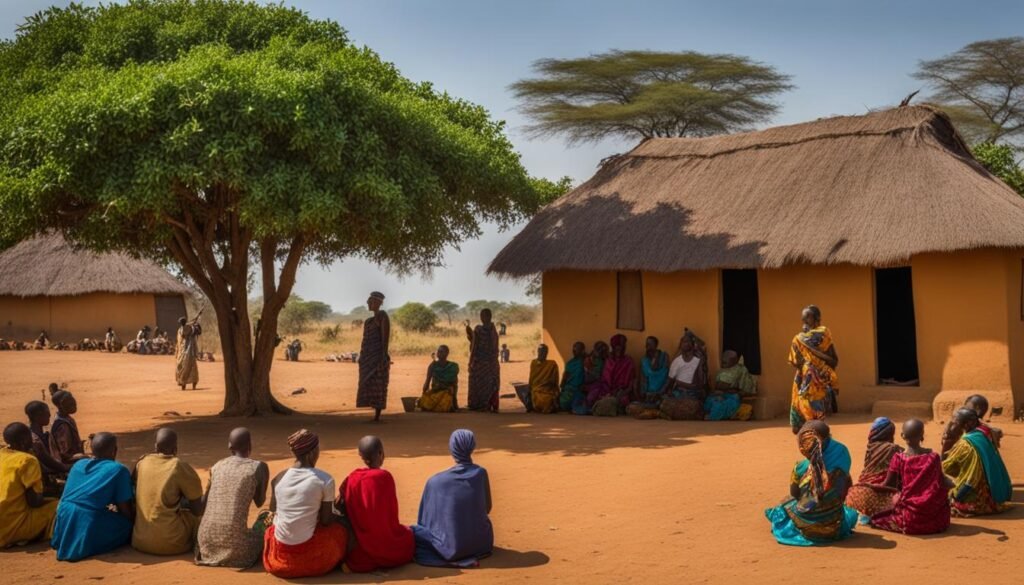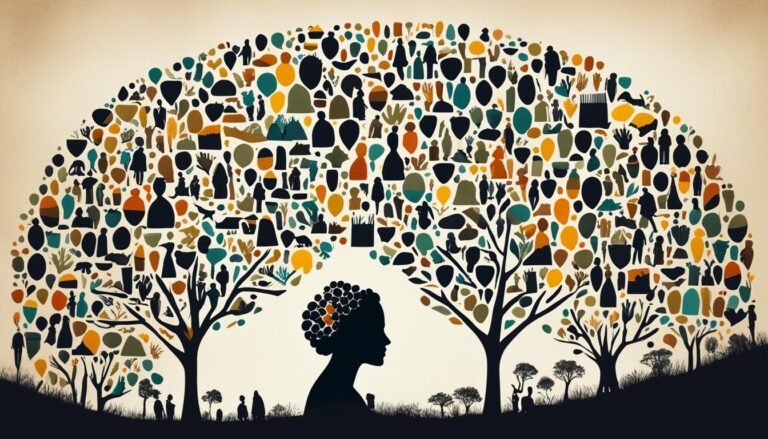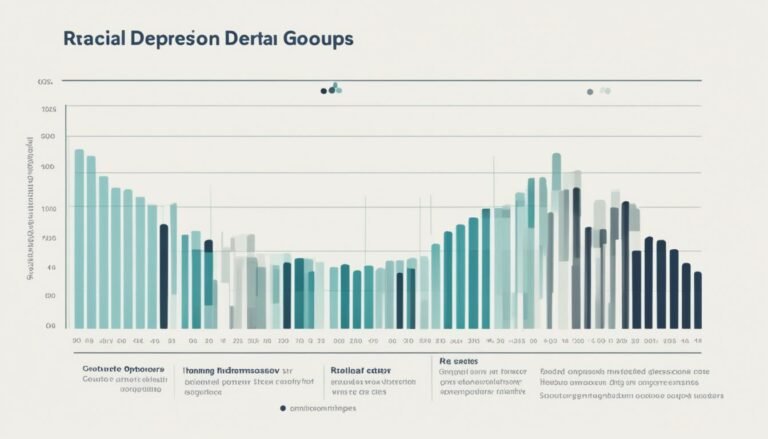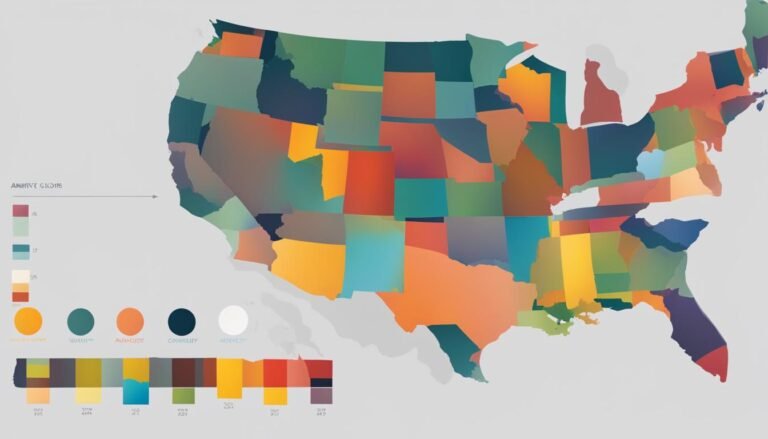How do Africans deal with mental health?
Mental health in Africa is a pressing issue that faces numerous challenges. Stigma surrounding mental health and a lack of resources compound the difficulties in addressing mental health issues across the continent. However, traditional African healing practices play a significant role in providing mental health resources and support in Africa.
Key Takeaways:
- Mental health in Africa is affected by stigma and a lack of resources.
- Traditional African healing practices play a significant role in addressing mental health issues.
- Africa faces various mental health challenges, including a high prevalence of mental disorders and limited access to care.
- Efforts are being made to raise mental health awareness and challenge stigma in Africa.
- Contemporary therapies and community support are increasingly recognized as important in addressing mental health in Africa.
Mental Health Challenges in Africa
Africa faces significant mental health challenges, encompassing a wide range of issues. These challenges contribute to the overall burden of mental disorders on the continent, affecting individuals, families, and communities. Key challenges include a high prevalence of mental health conditions, limited access to mental health care, and inadequate funding for mental health services.
According to African mental health statistics, a significant portion of the population experiences mental health issues. Depression, for instance, is one of the most prevalent mental health disorders in Africa. It affects millions of individuals, leading to profound personal and societal consequences.
The lack of resources and infrastructure further exacerbate the mental health challenges in Africa. The continent faces a shortage of mental health professionals, including psychiatrists and psychologists, making it difficult for individuals to access timely and quality care.
Despite these challenges, it is important to note that mental health issues have often been overlooked or stigmatized in African societies. This has led to a significant gap in understanding and addressing mental health needs. However, efforts are being made to raise awareness, challenge stigma, and improve mental health services across the continent.
The Prevalence of Mental Health Disorders
The African region bears a substantial burden of mental health disorders. According to the World Health Organization (WHO), over 100 million people in Africa are estimated to have a mental health disorder, with the majority experiencing moderate to severe impairments in their daily functioning.
| Common Mental Health Disorders in Africa | Prevalence |
|---|---|
| Depression | ~30% of the population |
| Anxiety disorders | ~15% of the population |
| Substance use disorders | ~10% of the population |
| Psychosis | ~3-5% of the population |
These statistics highlight the urgent need for mental health care and resources in Africa to adequately address the prevalence of mental health disorders across the continent. Without appropriate interventions, the long-term consequences can be severe, impacting individuals’ well-being and hindering socio-economic development.
In the face of these challenges, it is crucial to recognize and prioritize mental health as an integral part of overall healthcare systems. By investing in mental health services, increasing awareness, and fostering international collaborations, Africa can make significant progress in addressing the mental health challenges it faces.
Traditional African Healing Practices
Traditional African healing practices have been utilized for centuries as a means to address mental health concerns. These practices encompass a wide range of rituals, ceremonies, and the use of herbs and natural remedies. Deeply rooted in the cultural beliefs and traditions of diverse African communities, these healing practices play a crucial role in providing mental health resources in Africa.
“Traditional African healing practices have been passed down from generation to generation, serving as a cornerstone of healing within our communities. These practices not only focus on physical ailments but also acknowledge the connection between the mind, body, and spirit.”
The use of traditional healing practices in mental health care demonstrates a holistic approach that recognizes the interconnectedness of various aspects of a person’s well-being. It emphasizes the importance of addressing not only the symptoms but also the underlying causes of mental health issues.
Herbal remedies, for instance, are often utilized in traditional African healing practices to treat common mental health conditions such as depression and anxiety. Certain herbs are believed to have calming properties and can help restore balance and harmony within the individual.
Moreover, rituals and ceremonies associated with traditional healing practices provide a space for emotional expression, community support, and connection with ancestors and spiritual entities. These communal gatherings offer a sense of belonging and cultural identity, which are essential elements in fostering mental well-being.
Table: Traditional African Healing Practices
| Practice | Description |
|---|---|
| Divination | Seeking guidance through spiritual means to diagnose the root causes of mental health issues. |
| Herbal Medicine | The use of specific herbs and plants to address mental health conditions and promote overall well-being. |
| Rituals and Ceremonies | Engaging in symbolic acts and communal gatherings to promote healing, emotional release, and spiritual connection. |
| Storytelling and Wisdom Sharing | Passing down knowledge and sharing experiences as a means to educate, inspire, and heal individuals and communities. |

While traditional African healing practices continue to be an integral part of mental health care in Africa, it is important to recognize the need for a comprehensive approach that combines both traditional and contemporary methods. Integration of these practices can lead to a more inclusive and accessible mental health system that meets the diverse needs of individuals and communities across the continent.
Overcoming Mental Health Stigma in Africa
Stigma surrounding mental health continues to be a significant barrier to seeking help in Africa. Negative attitudes, discrimination, and misconceptions contribute to the stigma associated with mental illness. Efforts are being made to raise mental health awareness in Africa and challenge the deeply ingrained stigma.
The consequences of mental health stigma in Africa are far-reaching. Individuals facing mental health challenges often encounter social exclusion, prejudice, and even violence due to the prevailing beliefs and misconceptions surrounding mental illness. These harmful attitudes prevent individuals from seeking the necessary support and treatment, leading to prolonged suffering and exacerbation of their conditions.
However, there is hope. Advocacy and awareness campaigns are emerging across the continent to combat mental health stigma and foster a more supportive environment. These initiatives aim to educate the public about mental health, challenge negative stereotypes, and promote acceptance and understanding.
One notable example is the Mentally Aware Nigeria Initiative (MANI), which aims to raise mental health awareness and reduce stigma in Nigeria and beyond. Through various programs, including school campaigns, mental health workshops, and online platforms, MANI seeks to destigmatize mental illness and provide support to those in need. Similar organizations and initiatives are taking root in other African countries, contributing to the growing movement to address mental health stigma in the region.
“Stigma surrounding mental health is deeply ingrained in our societies, but it’s not insurmountable. By engaging in open conversations, dispelling myths, and providing support, we can create a more inclusive and compassionate society for individuals with mental health challenges.” – Dr. Kigongo Kamana, Founder of the African Mental Health Alliance
Education and awareness play a crucial role in overcoming mental health stigma in Africa. By dismantling misconceptions and fostering empathy, communities can create safe spaces where individuals feel comfortable seeking help and support. This shift in attitudes is essential for improving mental health outcomes and ensuring that no one is left behind.
Additionally, efforts are underway to integrate mental health education into schools and healthcare systems, ensuring that future generations grow up with a better understanding of mental health and combatting stigma from an early age. By normalizing conversations about mental health and providing resources for early intervention, we can lay the foundations for a more mentally healthy Africa.
Key Takeaways:
- Mental health stigma continues to be a significant barrier to seeking help in Africa.
- Negative attitudes, discrimination, and misconceptions contribute to the stigma surrounding mental illness.
- Advocacy and awareness campaigns aim to challenge mental health stigma and promote acceptance.
- Organizations like MANI are working towards reducing mental health stigma in Nigeria and other African countries.
- Integration of mental health education in schools and healthcare systems is crucial for combating stigma from an early age.
Contemporary therapies and community support
While traditional healing practices have their place, there is also an increasing recognition of the importance of contemporary therapies and community support in addressing mental health in Africa.
Mental health support services, counseling, and therapy are being provided by organizations and initiatives across the continent to improve access to mental health care in Africa.
“The integration of contemporary therapy approaches and community-based support systems is crucial in providing comprehensive mental health care in Africa.”
These organizations and initiatives aim to bridge the gap between traditional healing practices and modern therapeutic interventions, recognizing the diverse needs and preferences of individuals seeking mental health support.
Community Support and Mental Health
In addition to formal therapy, community support plays a vital role in promoting mental well-being in Africa. Support groups, community centers, and peer mentoring programs offer individuals a safe and inclusive space to share their experiences and receive support from others facing similar challenges.
These community-based initiatives not only provide emotional support but also help combat the isolation and stigma often associated with mental health issues.
African Mental Health Support Organizations
Several organizations in Africa are dedicated to providing mental health support and care. Here are a few notable examples:
- Africa Mental Health Foundation
- Mindful Africa
- Mental Health Society of Ghana
These organizations collaborate with local communities, healthcare professionals, and international partners to raise awareness, destigmatize mental illness, and ensure access to culturally sensitive mental health care services.
Case Study: The Mbali Trust
The Mbali Trust is a grassroots organization that offers comprehensive mental health support to rural communities in South Africa. Their programs include counseling services, educational workshops, and community outreach initiatives.
Through their efforts, the Mbali Trust has successfully increased mental health awareness, reduced stigma, and facilitated access to professional mental health services in underserved areas.
Continuing Progress and Challenges
Despite the progress made in contemporary therapies and community support, challenges remain. Limited resources, including a shortage of mental health professionals and a lack of funding, hinder the expansion of mental health care services across the continent.
Efforts to address these challenges require collaboration between governments, healthcare institutions, NGOs, and international organizations to prioritize mental health and invest in sustainable solutions.
| Country | Percentage of Population Receiving Mental Health Support |
|---|---|
| Ghana | 12% |
| South Africa | 8% |
| Nigeria | 5% |
The role of government and international organizations
The role of government and international organizations is crucial in improving mental health care in Africa. By increasing funding, developing mental health policies and programs, and establishing partnerships with NGOs and other stakeholders, these entities can contribute to expanding mental health resources in Africa and ensuring access to quality care.
Government intervention is essential in allocating resources and implementing policies that prioritize mental health care. Increased funding can be directed towards the establishment and maintenance of mental health facilities, training healthcare professionals, and conducting research to better understand the mental health needs of the population.
Furthermore, government initiatives can support the development of mental health programs that address the specific challenges faced by African communities. These programs can focus on raising awareness, reducing stigma, and providing education on mental health issues. By implementing prevention and early intervention strategies, governments can play a proactive role in improving mental health outcomes.
International organizations also play a significant role in supporting mental health care in Africa. They can provide financial assistance, technical expertise, and advocacy to strengthen mental health services on the continent. These organizations often collaborate with local governments and NGOs to develop and implement comprehensive mental health programs that cater to the needs of the African population.
Through partnerships with local communities, government agencies, and international organizations, mental health care in Africa can be enhanced, and resources can be more effectively utilized. By prioritizing mental health and investing in sustainable solutions, governments and international organizations have the power to make a lasting impact on the well-being and quality of life for individuals dealing with mental health issues in Africa.
Mental Health Care Funding Comparison:
| Country/Region | Percentage of Total Health Budget allocated to Mental Health |
|---|---|
| Nigeria | 0.4% |
| South Africa | 5.4% |
| United States | 5.6% |
| United Kingdom | 12.6% |
| Australia | 13.5% |
The table above showcases the percentage of the total health budget allocated to mental health care in selected countries/regions. It highlights the disparities in mental health funding, with some countries dedicating a significantly higher percentage of their budgets to mental health care compared to others. This discrepancy underscores the need for increased investment in mental health resources in Africa to bridge the gap and ensure adequate care for those in need.

Conclusion
The mental health landscape in Africa is complex and presents various challenges. With a high prevalence of mental disorders and limited access to resources, addressing mental health in Africa requires a multifaceted approach.
Traditional African healing practices have long played a significant role in providing mental health resources in the region. These practices, rooted in cultural beliefs and traditions, utilize rituals, ceremonies, and natural remedies to address mental health issues.
While traditional healing practices are crucial, there is also a growing recognition of the importance of contemporary therapies and community support. Organizations and initiatives across Africa are providing mental health support services, counseling, and therapy to improve access to care.
However, the persistent stigma surrounding mental health remains a significant barrier. Overcoming stigma and increasing awareness are vital for promoting mental well-being and reducing the burden of mental disorders in Africa.
To create a comprehensive and sustainable mental health care system in Africa, it is essential for governments, international organizations, and grassroots initiatives to collaborate. Increased funding, the development of mental health policies, and partnerships with NGOs are necessary steps to improve access to mental health care and resources in the region.
FAQ
How do Africans deal with mental health?
Africans deal with mental health through a combination of traditional healing practices, contemporary therapies, and community support. Traditional healing practices, such as rituals, ceremonies, and the use of herbs, are deeply rooted in African culture and provide mental health resources. Contemporary therapies and counseling services are also offered by organizations and initiatives across the continent.
What are the mental health challenges in Africa?
Africa faces several mental health challenges, including a high prevalence of mental disorders and limited access to mental health care. African mental health statistics show that a significant portion of the population experiences mental health issues, with depression being particularly prevalent.
How are traditional African healing practices used for mental health?
Traditional African healing practices have been used for centuries to address mental health issues. These practices involve rituals, ceremonies, and the use of herbs and natural remedies. They are deeply rooted in the cultural beliefs and traditions of different African communities, providing mental health resources and support.
How can mental health stigma in Africa be overcome?
Mental health stigma in Africa can be overcome through efforts to raise awareness and challenge negative attitudes and misconceptions. Initiatives are being undertaken to increase mental health awareness in Africa and promote acceptance and understanding of mental illness.
What support is available for mental health in Africa?
African mental health support services, counseling, and therapy are provided by organizations and initiatives across the continent. These resources aim to improve access to mental health care in Africa and promote mental well-being within communities.
What is the role of government and international organizations in African mental health care?
The role of government and international organizations is crucial in improving mental health care in Africa. This includes increasing funding for mental health initiatives, developing mental health policies and programs, and establishing partnerships with NGOs and other stakeholders to expand mental health resources and ensure access to quality care.
What is the current state of mental health in Africa?
The mental health landscape in Africa faces various challenges, including a high prevalence of mental disorders, limited access to care, and stigma. Efforts from governments, international organizations, and grassroots initiatives are necessary to create a comprehensive and sustainable mental health care system in Africa.






